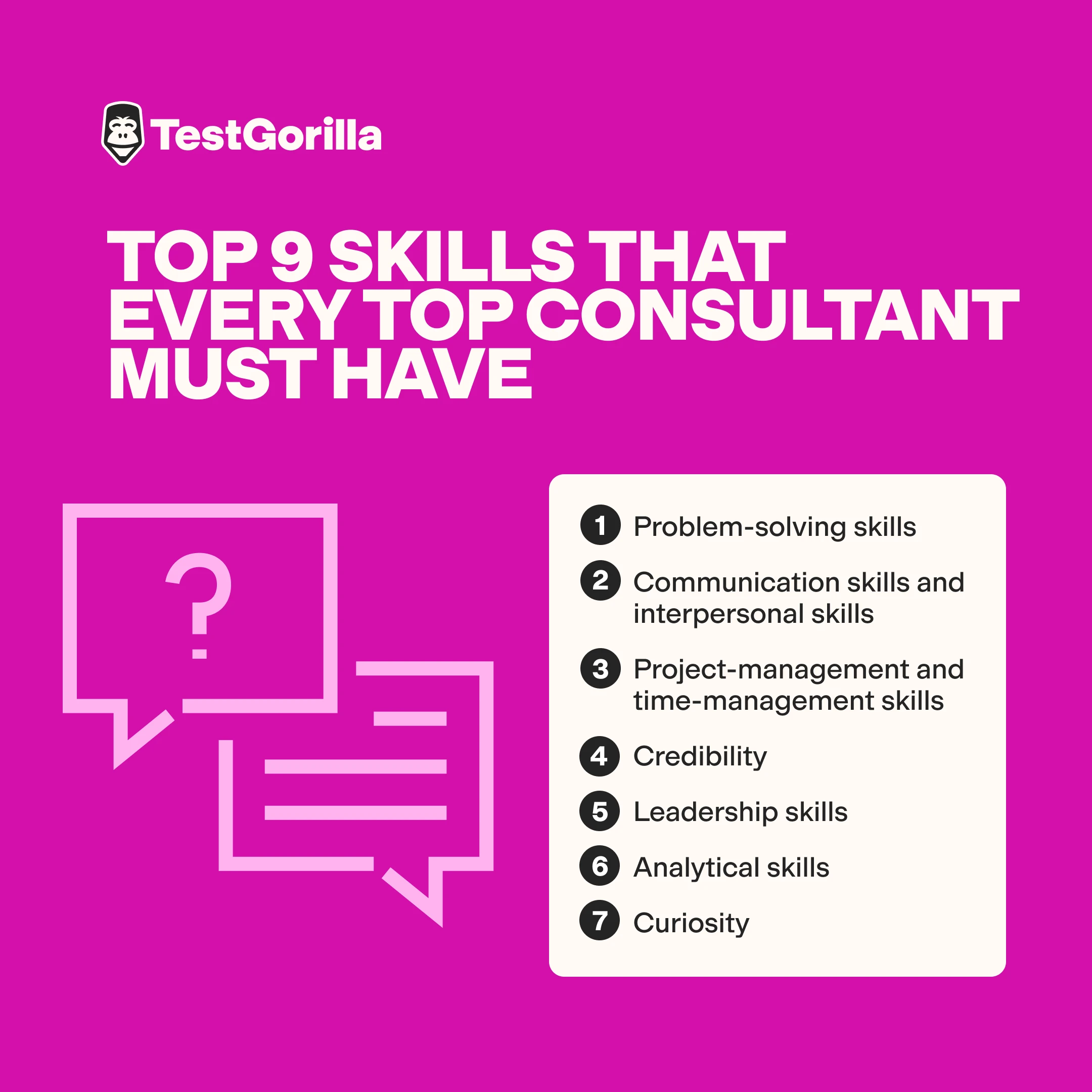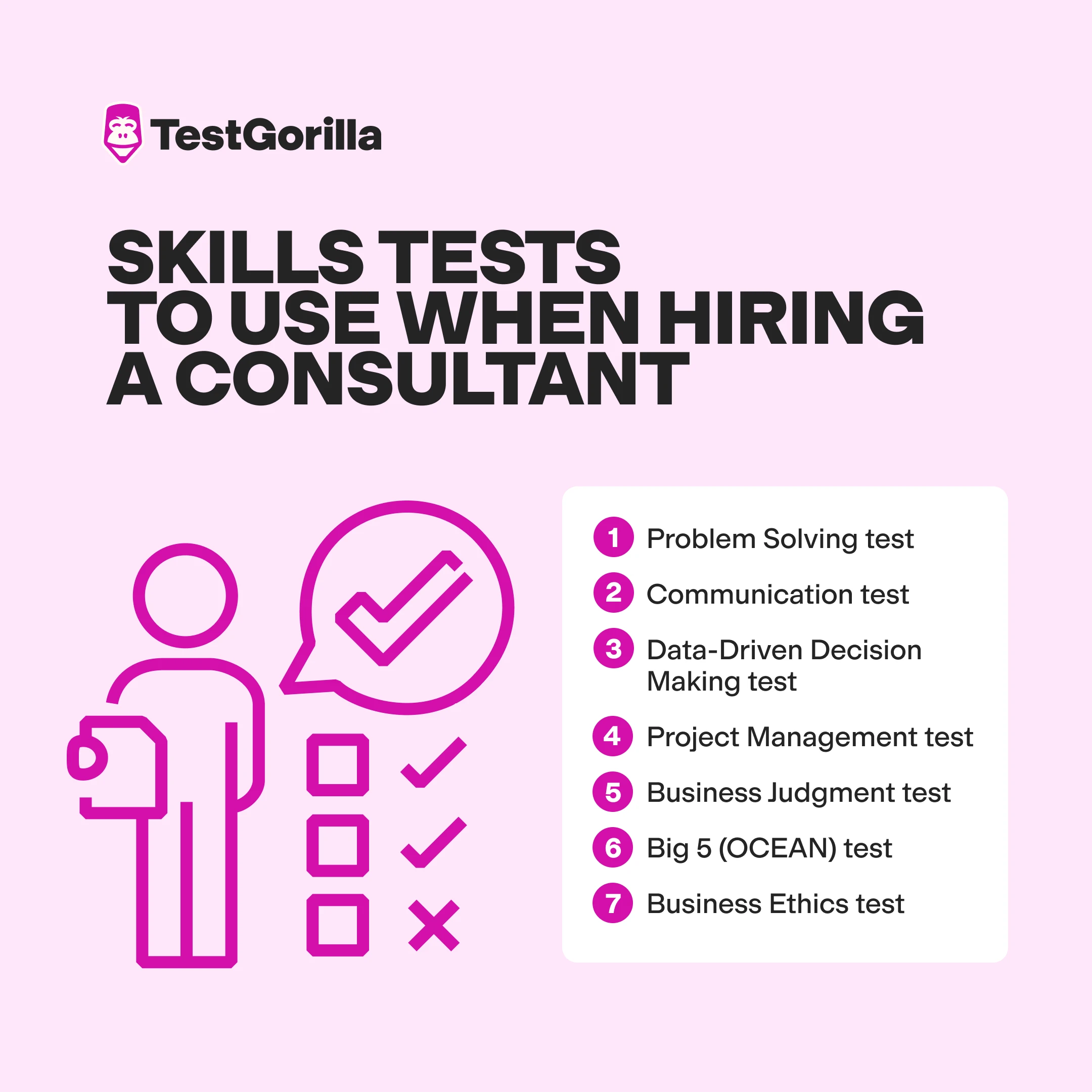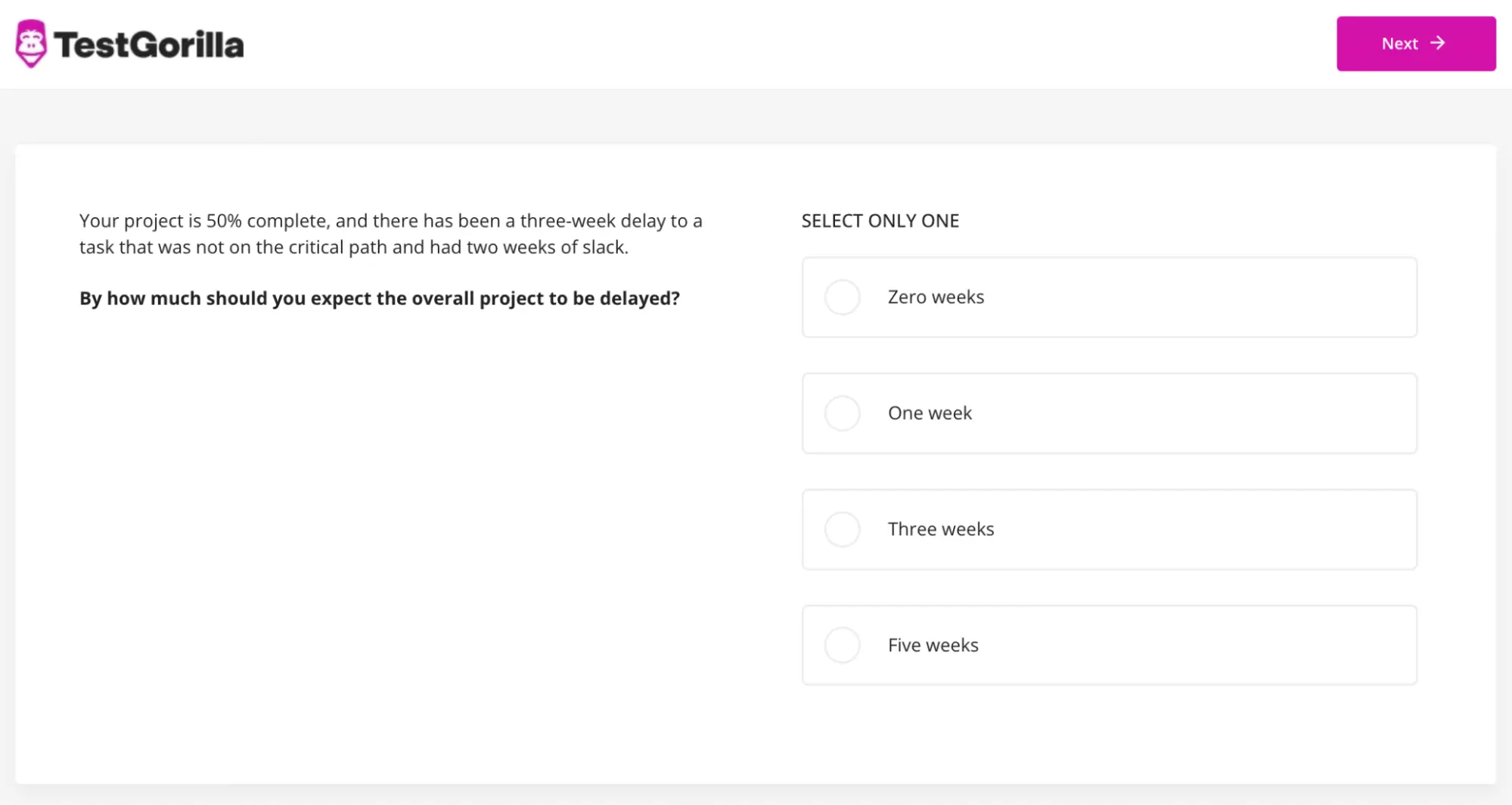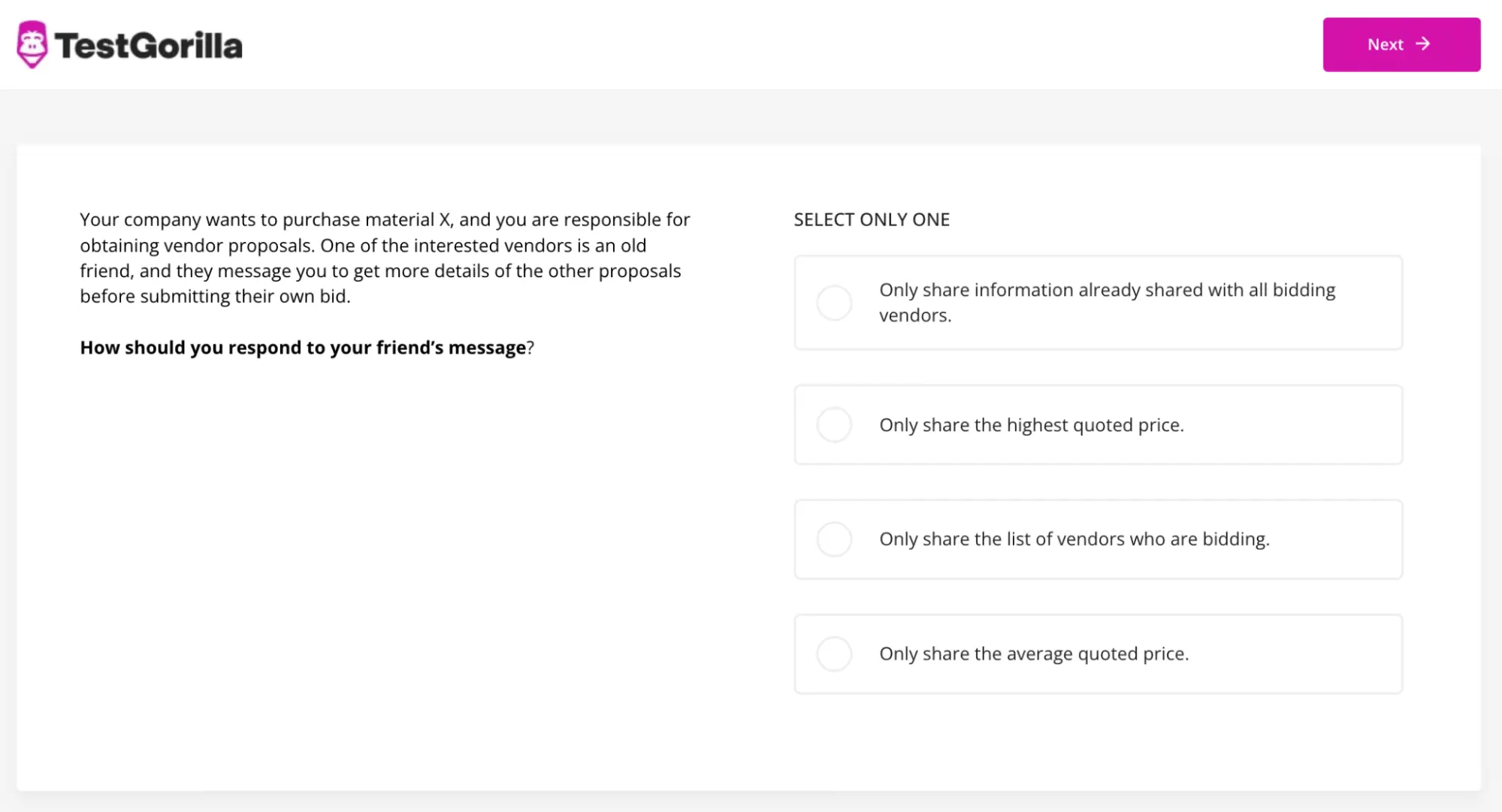Hire the best consultants every time with skills testing
Hiring a consultant can be a great force multiplier for your team or a huge headache if you pick the wrong candidate.
With each job posting attracting so many candidates, it can be challenging to sift through the pile of resumes and find the right talent. But with a winning strategy (that kicks resumes to the curb), you can hire for the top consulting skills and set your organization up for success.
In this post, we share the top 9 must-have skills for consulting, show you how to nurture those core consulting skills in new hires, and discuss how to measure consulting skills in a seamless and bias-free way.
Table of contents
What are the 9 top consulting skills or traits?
The skills required to excel at a consulting role vary based on the type of consultant.
For example, in innovation consultant job descriptions, employers focus on analytical, communication, and leadership skills. In contrast, a job description for a financial consultant emphasizes financial management consulting skills, proficiency in compliance, and expert knowledge of regulations and tax.
That said, there are nine skills that every top consultant must have.
1. Problem-solving skills
McKinsey reports that an incredible 37% of HR professionals rate problem solving as their top missing skill in new hires.
This makes it all the more important to hire consultants who excel at problem solving.
Whether they’re working on employee conflict resolution or assisting a business leader with their training programs, consultants must be adept at coming into your organization with little background information, quickly understanding your issues, and providing actionable solutions that fit your budget.
Problem-solving skills are mainly developed through experience, but not all experiences are equal. Look for consultants who have addressed challenges similar to those facing your firm because they have more applicable skills than those with more years of experience in other niches or less challenging environments.
2. Communication skills
Effective communication skills for consulting mean candidates know how to transmit solutions to teams as well as use active listening skills to understand problems and preserve client relationships.
For example, senior management wants to improve efficiency by introducing new training programs. So, since your employees must accept these suggestions and complete the training, consider whether your consultant can convey changes constructively, ensuring the team reacts positively.
The communication skills of a consultant are developed by sharing ideas in a broad variety of contexts, such as:
Brief conversations with the C-suite in a fast-paced environment
Tense meetings with conflicting stakeholders
Sensitive discussions on budget cuts and layoffs
These all nurture various aspects of consulting competencies.
You can’t rely simply on the level of polish during the consultant’s interview to assess communication skills because you’re counting on your consultant to succeed outside of a staged one-on-one or small-group conversation.
Let us show you how cutting-edge organizations hire consistently great consultants in a free, live demo of our assessment software.
3. Project-management skills
Your new consultant must have the project-management knowledge and skills to facilitate the planning and scheduling processes, solve challenges related to resource allocation, and give teams the means to complete projects on time and within budget.
For example, consultants often juggle projects that require interdepartmental cooperation. A candidate with excellent project management consulting skills excels at this task, accurately prioritizing components of the larger project and assigning deadlines to each so that the overall deliverables arrive within spec and timelines.
4. Time-management skills
Consultants are among the highest-paid staff at your organization, and they often bill hourly. Make sure they offer a great bang for your buck by measuring their time-management skills.
This helps you hire workers who can adapt to unexpected changes and complete your organization’s consultant projects ahead of schedule and within the allotted budget.
5. Credibility
Credibility stems from both personality traits and soft skills. An honest, professional, and credible consultant gives you the following advantages:
Advantage | Details |
Interdepartmental buy-in | When working on complex and multifaceted projects, consultants require cooperation across departments. A consultant who exudes credibility and trustworthiness can seamlessly bridge gaps across even the most siloed organization. |
Peace of mind | If your consultant is honest and reliable, you can rest easy, knowing they complete tasks to a competent standard without the need for micromanagement. |
For example, if you are hiring a financial consultant, you know to evaluate their mathematical ability and their accounting skills, but it may be less intuitive to assess their trustworthiness, even though it’s just as critical.
So, when you’re selecting consultants, be sure to consider their overall credibility and adherence to consulting business ethics.
6. Leadership skills
The most impactful consultants shepherd talent and foster change – the same skill set that empowers your best departmental managers and team leads.
Take, for instance, a technical role like hiring an SEO consultant. You know that you need to staff that position with a subject-matter expert, someone who knows the difference between keyword stuffing and topic clustering.
It’s less obvious, but you can also give your organization an advantage by hiring for leadership skills. A consultant who is a skilled leader understands your existing team’s dynamics and can diplomatically push for more SEO budget.
The best way to develop leadership skills is through practice. Great leaders come from great teams with healthy dynamics where skilled staff learn through example and mentorship.
This means that ten years of experience as a team lead at an autocratic organization is worth little, while the same length of service in a collaborative environment is solid gold. It also means that unbiased talent assessments are key to spotting leadership skills – resumes don’t provide you with enough information to make the right call.
7. Analytical skills
Data analysis leads the way. When it comes time to assess what’s working and what isn’t, you should expect to see graphs, CRM reports, and endless spreadsheets.
While many teams have dedicated quants who help with this process, hiring consultants for analytical skills evens out your team’s workload and ensures data fluency at every stage of the decision-making process.
8. Curiosity
Successful consultants are a diverse group. One unifying factor among the best consultants is an abiding sense of curiosity, which helps them understand client problems and boosts engagement.
Take, for instance, consultants completing a financial audit. Both a curious consultant and their more serious colleagues can perform the basic, mechanical tasks of the audit. Trends discovered, data analyzed. Mission accomplished, right?
It’s not quite so simple. A curious consultant adds an additional layer of value by pulling on threads and discovering the why and root causes behind the data. Sales might be down, but if you don’t realize that sales are down immediately following new feature releases, you might never speak to sales staff and offer training on new features.
Hiring sales consultants who naturally seek explanations is a no-brainer.
Use TestGorilla to optimize your hiring process
Getting started with TestGorilla is easy. Our experts are happy to offer a walk-through tailored to your organization’s needs.
9. Interpersonal skills
The most impactful consultant is the quintessential “people person”: a strong listener who asks the right follow-up questions and shows emotional intelligence. Consultants with interpersonal skills are positively received by your existing staff, even when tackling the most sensitive and entrenched problems.
How do you find consultants with strong interpersonal skills? While many HR professionals struggle to identify tough-to-quantify soft skills, we have the solution for you. Read on for a comprehensive assessment strategy for your consultants and other high-priority hires.
How to assess core consulting skills and traits: Use skills tests
It’s daunting to look at a pile of consultant resumes and try to pick the winning needle out of the haystack. This often leads you to interview too many candidates and spend too long on recruiting.
The easiest way to ensure a replicable and unbiased hiring funnel for great talent is to replace resumes with a pre-employment screening platform like TestGorilla. Below, we’ve collected seven tests to help you find the skills needed for consulting.
We recommend creating a multi-measure assessment comprising five skill tests to measure your business consultant skills, so pick and choose from our shortlist based on your goals.
1. Problem Solving test
The Problem Solving test is the best way to determine whether your candidates can define and understand a problem.
The results tell you if applicants can carefully analyze information or data and use analytical skills to handle challenging problems. Can your consultant decide on the best actions or find innovative solutions based on the rules of your business? Use this test to find out.
2. Communication test
Need a method to review how well your consultant can communicate? Our Communication test is the optimum method for this.
It helps you find out if your consultant can:
Use active listening skills to understand your business problem
Clarify the next steps related to a complex problem
Show empathy and share empathetic solutions
3. Data-Driven Decision Making test
Our Data-Driven Decision Making test spotlights consulting candidates with the strongest intuitive grasp of the numbers and metrics that matter most to your organization.
More advanced than your typical test of spreadsheet skills, this test rigorously measures the candidate’s ability to pull insights from raw data, an essential ability for succeeding as a consultant in your organization.
4. Project Management test
Our Project Management test is the most precise method for reviewing a consultant’s project management skills. With this test, you examine if applicants can calculate project schedules and minimize risk to help you plan and budget.
For more example questions from this test, visit the Project Management test preview.
5. Business Judgment test
This Business Judgment test evaluates candidates' business consulting skills in the areas of:
Innovation and corporate and portfolio strategy
Cost transformation and digital transformation
Procurement, supply chain, and mergers and acquisitions,
Organization, operating model, and behavior change
Corporate finance, sales, and pricing
Value propositions and go-to-market
Customer segmentation and customer experience
6. Big 5 (OCEAN) test
The Big 5 (OCEAN) test gives you valuable insight into your consulting candidate’s personality. For instance, if you are looking for a curious and inventive professional to see out-of-the-box opportunities for your organization, the openness metric is the perfect instrument to measure that.
7. Business Ethics test
This Business Ethics test gives you a holistic view of the consultant’s moral compass at work and in the real world. If you had a choice between two technically competent consultants but knew one consultant was more reliable, wouldn’t you prefer working with the candidate you could trust? With the right tools, you can make this exact hiring decision.
Try TestGorilla for skills-based hiring
Get started with TestGorilla for an unbiased and seamless hiring funnel. Signing up takes only a minute and makes hiring top consultants a breeze.
The best insights on HR and recruitment, delivered to your inbox.
Biweekly updates. No spam. Unsubscribe any time.
Summary: The 9 top consulting skills and how to test for them
To cut a long story short, hiring the most impactful consultants for your organization requires a balanced approach to hiring, where you select candidates with a diverse mix of skills.
While this may seem like a tall order, particularly with how many applicants you need to work through, an assessment platform like TestGorilla makes data-driven hiring for consultants a breeze.
Consulting skills | How to test for them |
Problem-solving skills | Problem Solving test |
Communication skills and interpersonal skills | Communication test |
Project-management and time-management skills | Project Management test |
Credibility | Business Ethics test |
Leadership skills | Business Judgment test |
Analytical skills | Data-Driven Decision Making test |
Curiosity | Big 5 (OCEAN) test |
All of the tests mentioned in this table are available in our test library.
Simply choose your template or custom tests, send them to your shortlist of candidates, and watch as the all-star consultants rise to the top. By skipping the mis-hires, Orbit Technologies reported a 50% improvement in new employee retention.
How to develop core consulting skills
As a consultant, upskilling is an organic process that can happen at a consulting firm or through consulting projects. Take a few key steps to accelerate your consulting career, learning, and earning potential:
Understand your skills: Take a holistic inventory of the skills required for your consulting work.
Develop a plan for each skill: Take classes to reinforce your technical skills, seek certifications to prove your existing expertise, and review case studies. Soft skills are often developed through experience. For leadership skills, you can step forward for project leadership in your existing consulting job.
Document your development: It’s important to document the process as you grow in your role. Having examples and data that show off your skills persuades hiring managers, helping you stand out in a crowded field.
What makes a top consultant?
A good consultant has the perfect balance of intuitiveness and collaborative leadership skills. They can discern the finer points of a client’s challenges and use knowledge, experience, and teamwork to help them resolve problems.
One factor to note when hiring a consultant is that we should stop focusing on educational credentials to screen qualified candidates. Today, 64% have a bachelor’s degree, and 17% have a master’s, meaning education isn’t a major differentiation factor.
With the rise of skills-based hiring and alternative routes into employment, organizations are now looking for relevant skills instead of qualifications because this approach:
Focuses on what matters – how well can you do the job
Reduces unconscious bias (i.e., “we attended the same university”)
Opens the door for talent who took an alternative path to employment
Increases diversity
Review your consultants’ must-have skills and hire effortlessly
Hiring a consultant can be complicated, but it all begins with knowing the skills they require to complete their work. Remember that problem solving, communication, and project management are essential qualities to review once you’ve sourced consulting applicants.
And if you’re wondering how to hire a consultant with skills-based testing, we’re here to help.
Sign up for a free 30-minute live demo to see for yourself how much simpler it can be to hire the right person with a skills-based approach.
If you prefer to explore our system at your own pace, sign up for a Free forever plan today.
Consulting skills FAQs
Here are answers to four of the most commonly asked questions about consultative skills.
What are consulting skills?
“Consulting skills” refer to the hard and soft skills that a consultant needs to analyze and understand the requirements of new clients and struggling businesses. They also help consultants succeed at brainstorming solutions and providing tailored advice, support, and recommendations.
Why is critical thinking an important skill for consultants?
Critical thinking skills are crucial because they help consultants look beyond the expected, run-of-the-mill options for businesses. This skill makes it easier for consultants to embrace new ideas and innovative concepts that your business may not have tried, which can lead to cost-effective and time-saving solutions.
What are the most important soft skills in consulting?
The most important soft skills and traits for consultants include:
Communication, to share findings with team members
Leadership, to influence the team into accepting new strategies or frameworks
Business ethics, to ensure trustworthy results
Curiosity, to take the findings a step further for the most impactful results
What personality types are in consulting?
Technically skilled and highly independent, your average consultant exhibits the following personality traits:
Flexible
Persistent
Team-oriented
Communicative
Creative thinking
When hiring consultants, you can ensure the best possible hire by utilizing our Communication skills test to weed out the superficially charming applicants while prioritizing the professionals who excel in their profession.
You've scrolled this far
Why not try TestGorilla for free, and see what happens when you put skills first.






















